 Need to make calls with your business phone lines while enjoying the freedom to work from anywhere? You need a softphone.
Need to make calls with your business phone lines while enjoying the freedom to work from anywhere? You need a softphone.
As the world goes virtual and hybrid, a softphone solution is essential for companies to stay connected anywhere anytime. Gone are the days when business phone calls could only be made from the desk.
Table of Contents
- What is a Softphone? →
- Benefits of Using Softphone →
- Key Features of Softphone →
- Softphones vis Deskphones →
- What are the Best Softphone Apps? →
- Best Phone System with Softphone Included →
What is a softphone?
Softphones are software-based phone systems that allow users to make and receive phone calls over the internet using their computer or mobile device. It is essentially a virtual phone that simulates the functions of a traditional telephone handset, but without the physical hardware.
With a SIP softphone, users can access features like visual call management, voicemail, call forwarding, and additional unified communications features like chat and messaging. In most instances, the software-based application relies on VoIP (Voice over Internet Protocol) to enable voice communications over the Internet.
VoIP phone system providers such as Yeastar typically offer softphone apps to download. Alternatively, there are also standalone softphone systems that require further configuration.
How does a softphone work?
A softphone runs on most devices and platforms. You can easily install the software on devices running operating systems such as MacOS, Windows, Android, and iOS. Some softphones can also run from a web browser.
Better yet, if your softphone is provided by your phone system provider, you barely need any setup. Just download and install, and then it can be used immediately.
For example, here’s a screenshot of Yeastar’s Linkus softphone for business, which runs on mobiles, desktops, and web browsers:
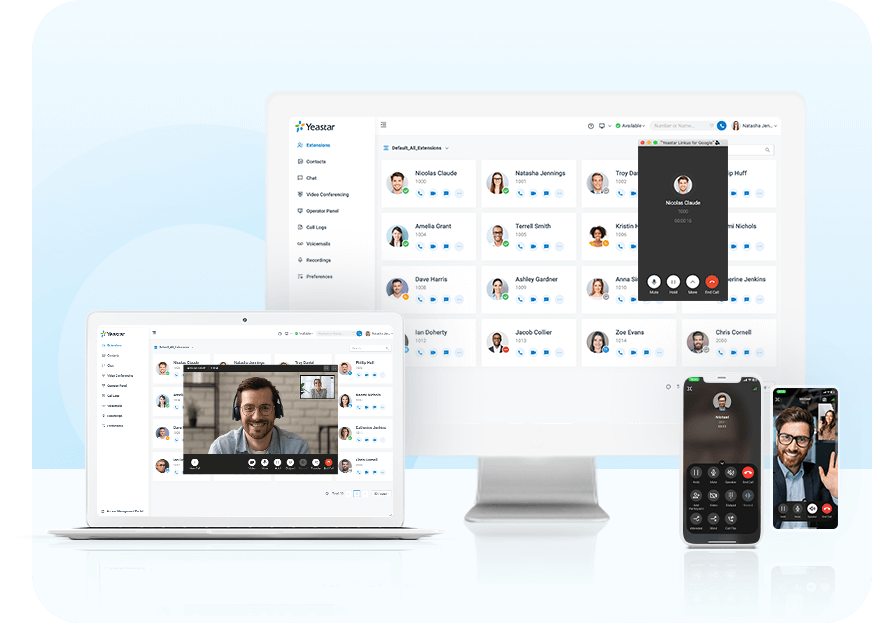
Why do businesses use softphones?
VoIP Softphones boast a number of advantages over traditional desk phones for business. Here are some to highlight:
- More Cost-effective than Traditional Desk Phones
- Instant Setup and Deployment
- Access to More Features
- Easy Portability. Ideal for Hybrid Workers
Cost-effective Alternative to Desk Phones
Softphones relieve you of the financial burden of purchasing or leasing many physical phones. You also don’t have to pay that much for running comm. Lines just to ensure that phone service is available. This lack of equipment also eliminates most future maintenance costs.
Better yet, you typically get all virtual phone functionality included with your existing business phone system. This way, you are saving on equipment and get a full-featured app.
Instant Setup and Deployment
You will quickly find that softphones save you from tedious installation and configuration. You also don’t need the wiring you once did with traditional landline phone systems. In many cases, all you need is a microphone and speaker.
Access to More Features
Softphones typically offer a wider array of VoIP features compared to conventional phones. These features can improve call handling efficiency, boost teamwork, and streamline communication.
For example, a robust softphone like Yeastar Linkus offers a single app that supports multiple forms of communication. Send an in-meeting message during a video conference. Click to initiate a video call with home-based colleagues or customers instantaneously. Initiate call recording to capture something urgent. Make telephone calls directly from your CRM dashboard. Click phone numbers on a website to make a call instantly from Linkus.
Easy Portability. Ideal for Hybrid Workers
The features of a softphone system are perfect for remote work environments. All business phone system features for in-office workers are available anywhere else in the world. This solution is also ideal for BYOD (Bring Your Own Devices). Employees simply need to install the app on their chosen mobile phones or computers, and they can have their office phones with them wherever they are.
Remote workers can make and take calls from anywhere as if they were at the desk, and keep their personal phone numbers private.
What are the must-have softphone features?
Contrary to what its name suggests, softphone softwares are capable of more than making and handling calls. They also provide unified communications capabilities. Here are some examples:
- Call Management Features, which include Call Forwarding, Call Transfer, Call Hold, Call Mute, Call Recording, Call Flip/Switch, and more features.
- Presence. Presence status allows users to know their coworker’s real-time availability at a glance. Status indicators can be color-coded with customized descriptions.
- Contact List. Store, access, and manage personal or shared business contacts. Never search back and forth for the best number to reach someone with PBX-native contacts management and contact synchronization from 3rd-party CRM.
- Team Chat (Instant Messaging). Use your internet connection for one-on-one chat, group chat, and file sharing.
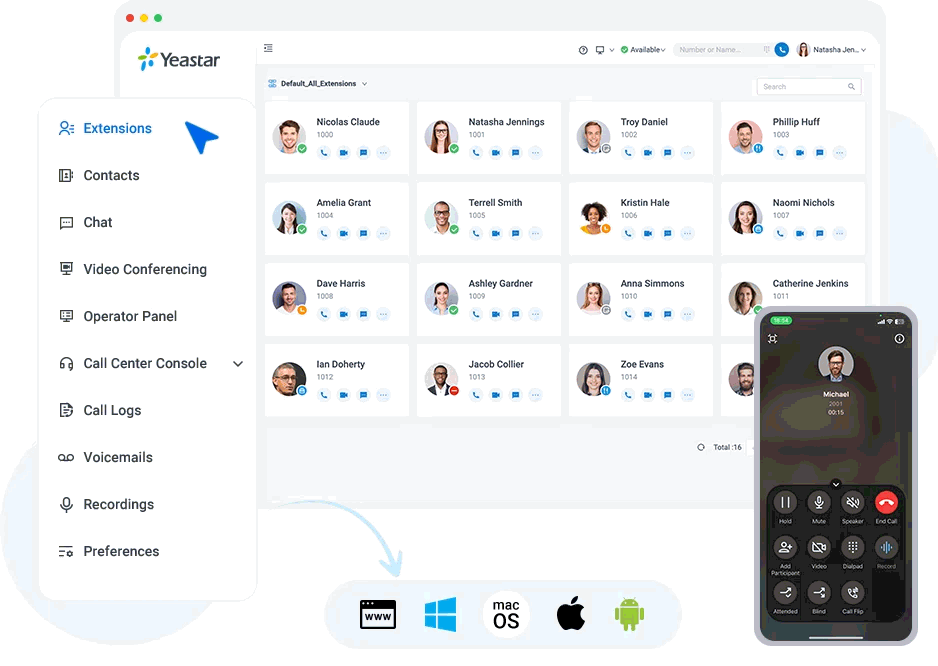
- Text Messaging. Manage, receive, answer, and send your business WhatsApp and SMS messages right from your softphone, using your business number. The functionality of omnichannel messaging allows you to manage all customer chats in one place.
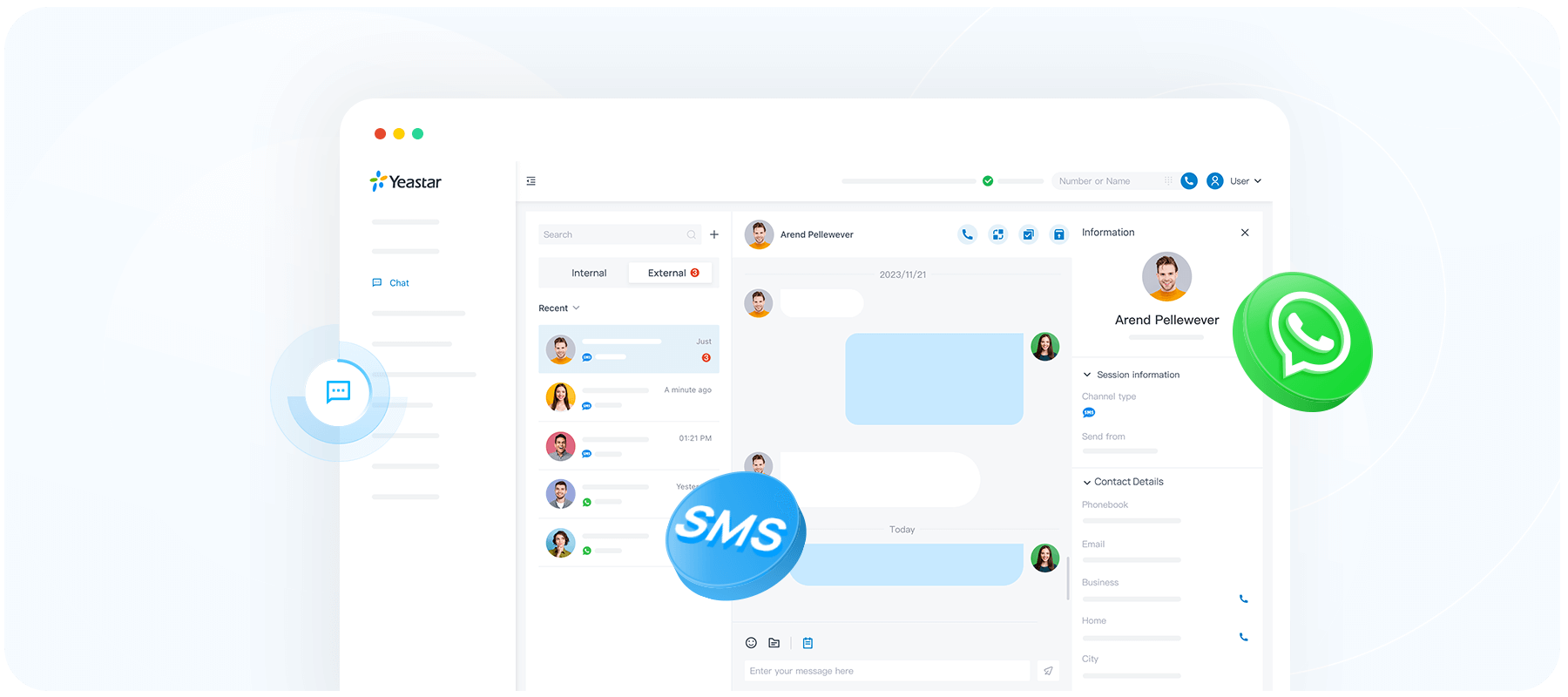
- Video Calling & Video Conferencing. Integrated video conferencing is a key component, of course. Users may be able to use features like screen sharing and team chat during an online meeting. Besides, 1:1 video calling also enables users to see each other in the flesh on a daily basis anywhere anytime.
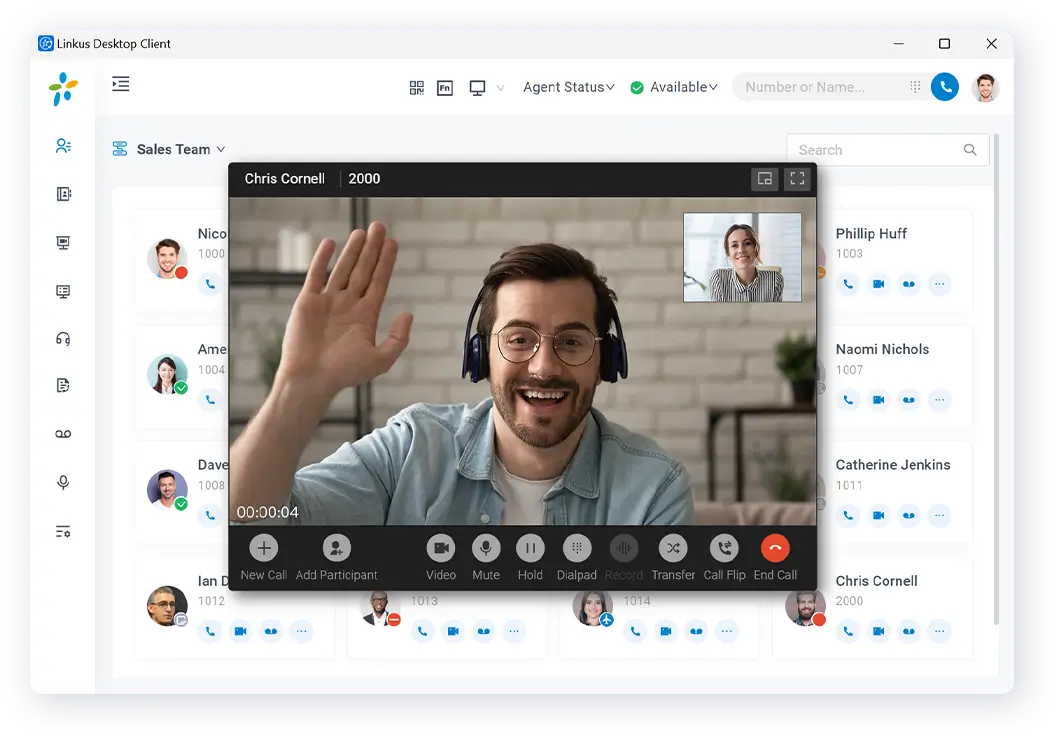
- CRM Integration. Linkus UC softphone supports seamless CRM integration with HubSpot, Zoho, Zendesk, Salesforce, Bitrix24, Odoo, etc. This enables users to click to call CRM contacts, save call journals, and have a holistic view of customers via call pop-ups. Learn more
- Remote Desk Phone Control. Computer Telephony Integration (CTI) makes it possible for easy click-to-dial from your desktop while still using a physical internet-based desk phone. You’ll be able to enjoy greater audio quality, while also increasing the call efficiency of your hard phone.
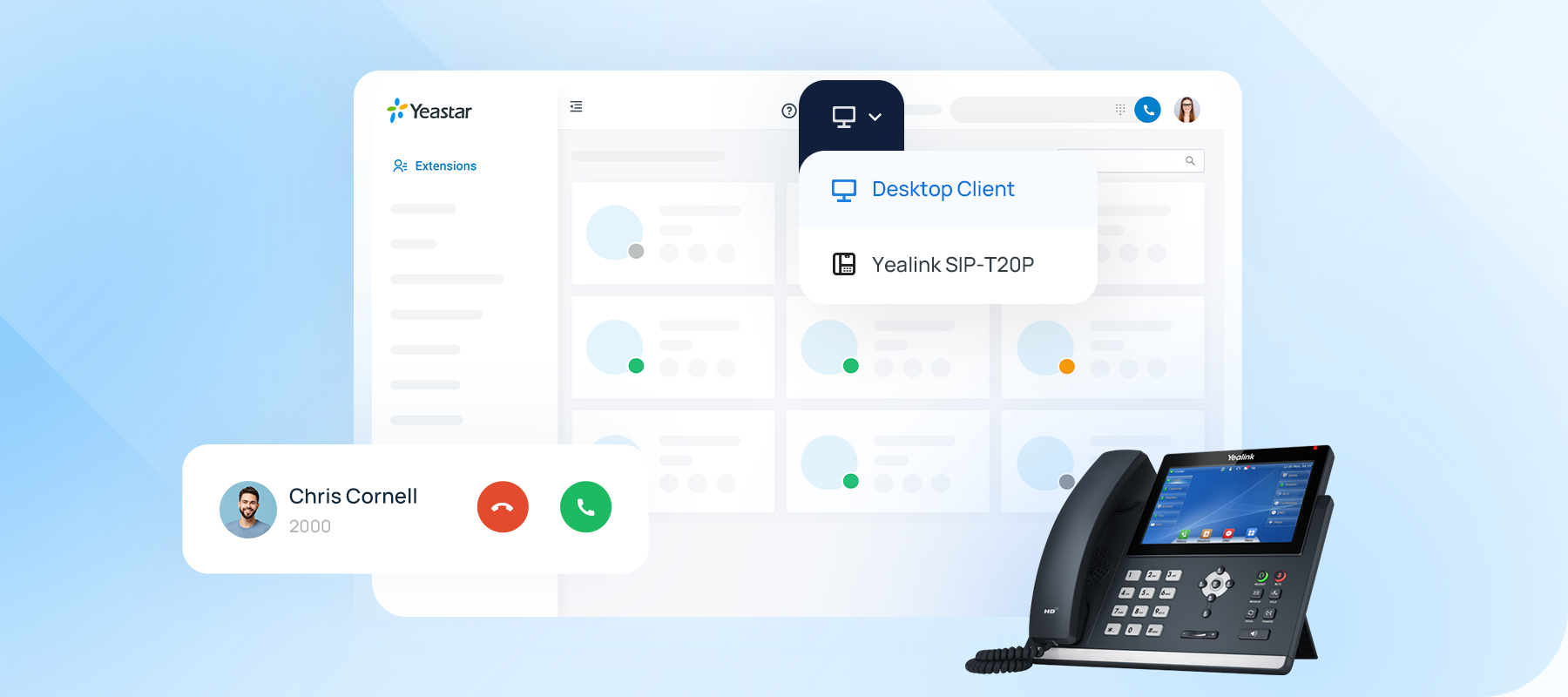
Are softphones better than hard phones?
Truthfully, softphones are really not in competition with hard phones. Both serve as important when users need to make a call, send a message, or manage their business communications. The difference is that a hard phone is a physical phone, and softphones simply emulate the functions of phones using VoIP technology. Employees may have valid reasons for preferring one or the other. That’s why a good provider understands the need to have both available in a single telecommunications solution.
Softphones vs. Deskphones
Here’s a comparison chart highlighting the differences and pros and cons of softphones and hard phones (traditional phones):
| Comparison | Softphone | Deskphone |
|---|---|---|
| Cost | Low cost, as it utilizes existing devices (computer, mobile) | Higher cost, requires dedicated hardware purchase |
| Flexibility | Can be used on various devices and locations | Restricted to the physical location of the phone |
| Features | Rich features like call forwarding, video calls, etc. | Limited features compared to softphones |
| Mobility | Portable, can be used anywhere with an internet connection | Not portable, restricted to the physical location |
| Setup | Easy setup, only requires software installation | Requires setup involving phone line and hardware |
| Call Quality | Dependent on internet connection quality | Consistently better call quality |
What are the best softphones for business?
When choosing a softphone for your business, you have many options, but here’s a quick round-up of different voice-over-IP apps.
1. Yeastar Linkus
Designed for the Yeastar Phone System, Yeastar Linkus UC Clients is a free softphone app that brings more than calling functionality. It enables users to easily access a comprehensive suite of calling, meeting, messaging, voicemail, presence, and more features.
With a simple download and intuitive interface, it runs on any desktop (Windows, Mac), mobile device (iOS, Android), and web browsers. Employees can stay connected with colleagues and customers where, when, and however they prefer. Download the app to experience more
2. Zoiper Softphone
Zoiper is a standalone softphone application that allows users to make voice and video calls using the SIP protocol. The application is known for its flexibility to support various VoIP service providers and PBX systems. However, it requires IT pros to set up and deploy across your company.
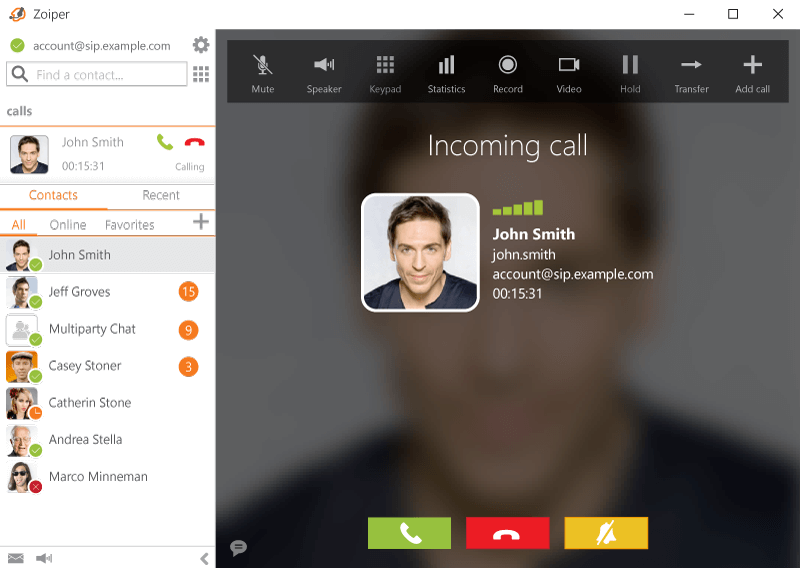
Zoiper call screenshot
3. Bria Solo
Developed by CounterPath, Bria Solo supports standard telephone features, along with advanced functions such as audio and video calls, and messaging. The range of features supported depends on the specific Bria solution that users subscribed to.
In a more practical sense, Bria Solo serves as a useful dialer for evaluating a SIP trunk or for less intensive voice communication tasks.
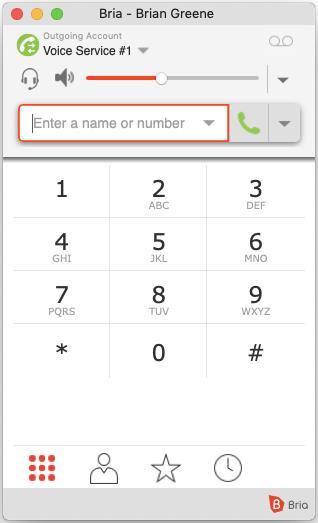
4. Zoom Phone
Zoom Phone is a cloud-based phone system mainly for businesses primarily operating in the United States and Canada. It provides voice calling, video conferencing, and messaging capabilities.
It is a part of the Zoom unified communications platform, which has gained popularity for its video conferencing software. However, it’s not a good choice for outbound calling as it requires additional credits. Also, many sophisticated business phone system features charge extra.
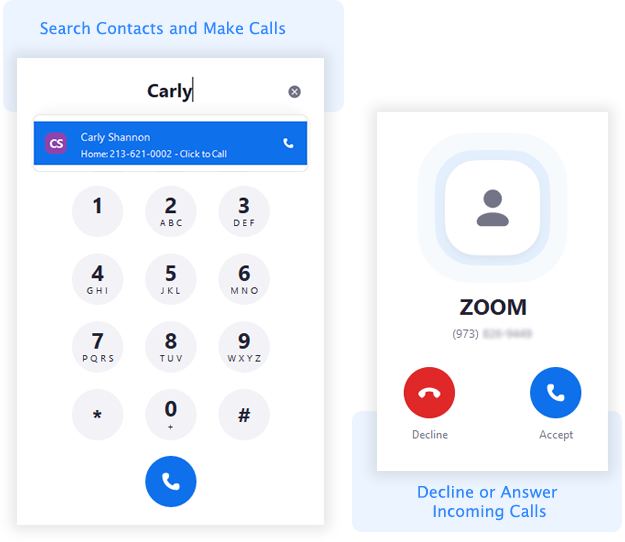
Best Phone System with Softphone Included
Whether you opt for a softphone or a desk phone, you need the right business phone system to support your business call routings and many others.
Yeastar P-Series Phone System offers a comprehensive solution that includes a built-in softphone. This enables your teams to seamlessly make calls, conduct meetings, chat, and more, all within a single user-friendly app. Setting it up is a breeze and you can get started in just minutes with our 30-day free trial, without any obligations.
Learn key capabilities of Yeastar Phone System with the short video: PBX, Call Center, Omnichannel Messaging, and many more—all designed for business productivity and efficiency.

